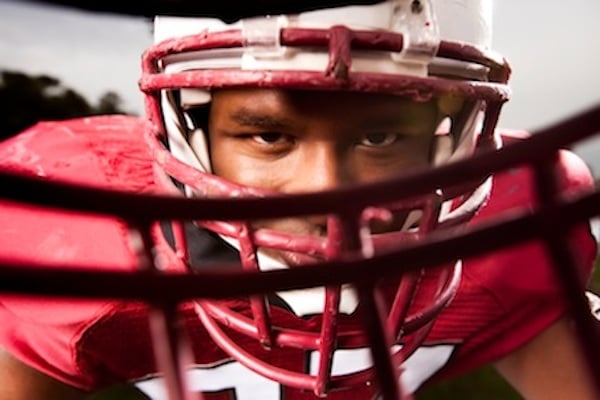
The NFL will survive the media feeding frenzy that Rich properly decries in his Politico column. The news cycle will move on, the storylines on the field will overtake the storylines in courts and the commissioner’s office, and all will once again be well in pro football.
At least for now.
But there’s a much larger issue looming in the background — the toll on players’ bodies and minds from prolonged, violent collisions. Malcolm Gladwell started the conversation with his 2009 New Yorker article, “Offensive Play: How Different are Dogfighting and Football,” and the conversation hasn’t really stopped. Even football reporters — those people who owe their livelihood to football’s dominant popularity — are starting to express ambivalence about what happens to players over the long term. After steady growth, youth football participation is down almost 10 percent, with the “concussion crisis” seen as the prime cause. The concern over concussions isn’t just limited to college and pro sports, with one (NFL-funded) study indicating that high-school football players are almost twice as likely to suffer concussions as college football players. And high-school football players were almost twice as likely to suffer concussions as the athletes in the second-most-dangerous sport, lacrosse. (By the way, high-school lacrosse players suffer more concussions than college football players).
While the studies are interesting, they simply reinforce common sense. A sport built around violent, high-speed contact is going to result in more injuries than other sports. Parents should have known this well before Gladwell’s article and well before the “concussion crisis.” Moreover, many of those injuries have long-term consequences. How many middle-aged men are hobbled by “old football injuries?” Growing up in the South, lingering effects of football were simply a fact of life. From bank managers to car salesmen to accountants, the landscape was littered with guys who could trace scars on their knees or suffered enduring neck or back pain and stiffness from their playing days. My first cousin started at defensive end for Mississippi State University (I loved going to games in SEC stadiums and hearing “tackle by French” echo across the landscape,) and he still feels the effects of his college playing days.
So, yes, football breaks down the body. Not every player’s body. And maybe not even most players’ bodies. But, yes, it does break down the body more than other sports.
But does that mean we should shun it?
At the same time that I’ve known many, many men who suffer from football injuries, few (if any) have expressed regret for playing. In fact, many of them credit football for shaping their lives and character in profound and positive ways and look forward to seeing their own sons take the field. Of course, football does not build everyone’s character (as the NFL’s current troubles demonstrate), and it’s thus not a foolproof rite of passage into manhood, but football does offer something that young men need: an opportunity to show courage.
That’s not to say that one can’t show courage on the basketball court or the lacrosse field or in other, non-athletic ways, but football creates one of the more primal conflicts between your desire to win, to contribute to the team, and the instincts of self-preservation and pain-avoidance. I’ve found for young men, courage is habit-forming, but so is cowardice — to the point where many grown men now sneer at courage or treat its display with a kind of shrugging indifference, perfectly content to let others take the risks necessary to preserve our culture, protect our communities, and pass down enduring values to the next generation.
Last week I was reading The Atlantic’s Ta-Nehisi Coates, who was discussing his own growing distaste for football, and he said something that struck me as profoundly important not just to understanding the debate about football but to understanding how we make choices about our bodies and lives:
Part of this is my own mix of spirituality and atheism. I generally think of the ghost not in the machine, but as the machine. My body is me, and while my brain is particularly important, when I dislocate an ankle I have injured part of myself.
This materialist view, that counts what happens to our bodies as the most important of life’s considerations drives much of the modern discourse about parenting. We can’t agree about morals any longer, so we move to the lowest common denominator — the protection of our physical selves. The body isn’t a temple, it’s god himself. And we live to serve it.
As a Christian, my view is completely different. My body is not me, but the temporary vessel my soul inhabits. And while I should obviously care for my body, the care and feeding of my soul — the building of my character — is by far the most important consideration. Does the sheer joy of athletic competition, combined with the necessity of overcoming fear in the face of real risk, build character? It can and does. Is it worth risks to the body to build character? Absolutely.
I’ll repeat, football is not the only sport that can teach character and courage. Waterloo was reputedly won “on the playing fields of Eton,” and they certainly weren’t playing American football, but if you slice football from the ranks of acceptable sports, then there will only be a new “most dangerous sport in school,” and parents will be made to feel irresponsible for risking little Johnny’s head and legs on the lacrosse field, the soccer pitch, or the basketball court. The problem with football isn’t the sport itself, but our changing perception of acceptable risk.
Every parent must make their own decisions (indeed, forcing children into sports they don’t enjoy can cause an avalanche of family bitterness), but if we train our children to believe that pain and risk-avoidance are among the highest of values, then we cannot expect them to grow out of that belief. And there will be fewer and fewer young men willing to risk anything — much less risk everything — to preserve a nation and culture that was built at such great and enduring cost.
Play football or don’t play football, but please don’t make that choice because you’re afraid.
This article first appeared on National Review Online
Read more on the Patheos Faith and Family Channel and follow David on Twitter.









